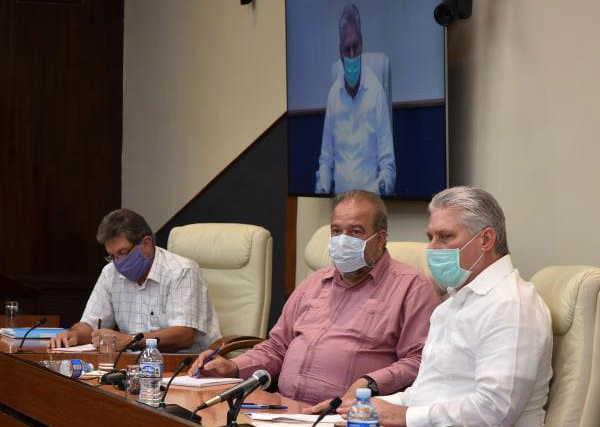
Speaking at a recent meeting, the President referred to medical discharges of recovered patients, saying, “These are lives that have been saved.”
Regarding this sensitive issue, he stated, “Given the pattern we have seen with patients in critical and serious condition, we must continue to insist that people seek medical attention the moment they note symptoms. The sooner the disease is identified, the sooner we can start treatment, which means a greater possibility of recovery.”
Diaz-Canel again referred to “the responsibility that parents have to keep their children home, not out playing on the street.” He also commented on the social indiscipline that is still evident in some areas. In this regard, he recalled complaints posted on the Presidency’s website criticizing individuals playing dominoes in the street, or continuing to frequent public places, late into the night.
“I believe,” he said, “that this call the population itself is making, is one we must all support.”
The President spoke about a number of experiences in different provinces, related to the care of the most vulnerable; the work of community members serving their neighbors at this difficult time, including the non-state sector, while commending the work of the National Revolutionary Police, providing information and controlling indiscipline – all of which can be extended to the rest of the country.
In his comments, Diaz-Canel directed the Ministry of Labor and Social Security to step up inspections, coordinated with provincial and municipal governments, to check compliance with measures to promote telecommuting, which, in his opinion, is not yet being used to its full potential. He likewise expressed concern about adherence to the policy that no person who is especially vulnerable to COVID-19, either because of age or health issues, be present in a workplace.
He urged the Ministry of Economy and Planning to “strengthen everything that supports food production, which is one of our fundamental tasks,” adding, “The fuel and resources we have already projected can be allocated now to agriculture, to meet plans for planting and food production, and this must begin to be regularly reviewed.”
He called for “the granting of land to be facilitated, with control but without bureaucracy, because there are people requesting it right now.”
First, he said, we must insist that those who have land produce more under these conditions, and on the other hand, anyone who wants to expand the land they hold in usufruct should be supported, adding, “Let’s not delay the procedures and not create obstacles to what we want to achieve in food production.”
Minister of Public Health José Ángel Portal Miranda presented the usual update on the situation of the pandemic worldwide and in Cuba, during the meeting.
Portal reported that on April 1, some 100,000 rapid diagnostic tests for COVID-19 were transported to all provinces. These will be used to test vulnerable groups, including those with acute respiratory infections, the elderly, as well as those under observation in isolation centers, who had contact with confirmed cases or traveled abroad.
Referring to centers where Cuban citizens returning from abroad are isolated, Prime Minister Manuel Marrero stressed the importance of attending to these sites, responding to any problems that may arise, and maintaining regular monitoring of available capacity.
Compliance with measures being implemented by the Ministry of Transport was also reviewed during the meeting, as well as the performance of the Havana Provincial Defense Council – all as part of a central government work system that gives priority to the battle against COVID-19.
 Escambray ENGLISH EDITION
Escambray ENGLISH EDITION





Escambray reserves the right to publish comments.